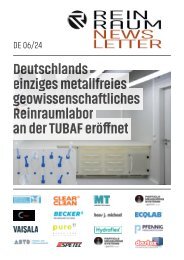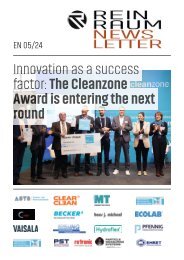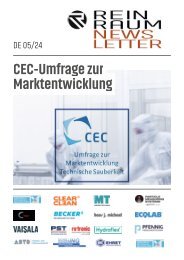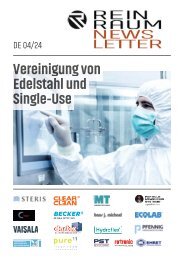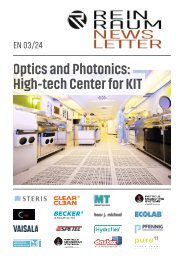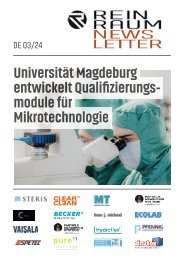Newsletter_07-2024_EN
You also want an ePaper? Increase the reach of your titles
YUMPU automatically turns print PDFs into web optimized ePapers that Google loves.
Acquisition will advance Merck’s integrated offering for viral vector manufacturing.<br />
Merck Signs Definitive Agreement<br />
to Acquire Life Science Company<br />
Mirus Bio for US$ 600 million<br />
– Acquisition will advance Merck’s integrated offering for viral vector manufacturing<br />
– Complements existing portfolio for development and production of novel modalities such as cell and gene therapies<br />
– Novel modalities are a key growth area for Merck’s Life Science business sector<br />
Merck, a leading science and technology company, has signed a<br />
definitive agreement to acquire life science company Mirus Bio for<br />
US$ 600 million (around € 550 million). Based in Madison, Wisconsin,<br />
USA, Mirus Bio is a specialist in the development and commercialization<br />
of transfection reagents. Transfection reagents, such as<br />
Mirus Bio‘s TransIT-VirusG<strong>EN</strong>®, are used to help introduce genetic<br />
material into cells. These reagents play a key role in the production<br />
of viral vectors for cell and gene therapies.<br />
“This strategic acquisition is a further building block for accelerating<br />
growth in the break-through technologies of the future. As<br />
a leader in the production of viral vectors, our goal is to make the<br />
significant potential of cell and gene therapy available for patients<br />
worldwide,” said Belén Garijo, Chair of the Executive Board and<br />
CEO of Merck. “As a leading science and technology company, we<br />
are well-positioned to support our Life Science customers across<br />
the biopharmaceutical industry to bring new curative treatments to<br />
market.”<br />
“Novel modalities, such as viral vector-based cell and gene therapies,<br />
hold immense promise to improve the lives of patients. Combining<br />
Mirus Bio‘s leading technology with Merck‘s bioprocessing<br />
expertise and portfolio allows us to provide solutions for almost every<br />
step of viral vector development and manufacturing,” said Matthias<br />
Heinzel, Member of the Executive Board of Merck and CEO<br />
Life Science. “With our integrated offering along the viral vector value<br />
chain, we are now well-positioned to support our customers in<br />
this fast-growing market to positively impact the lives and health of<br />
patients worldwide.”<br />
“We have been driving innovation in nucleic acid delivery for<br />
two decades,” said Dale Gordon, CEO of Mirus Bio. “Merck’s broad<br />
portfolio, scale, and global reach, combined with our leading transfection<br />
reagents, will help take our business to even greater heights<br />
and allow us to serve more customers, and ultimately patients,<br />
worldwide.”<br />
The transaction with Gamma Biosciences, a life sciences platform<br />
established by global investment firm KKR, for the acquisition<br />
of Mirus Bio is expected to close in the third quarter of <strong>2024</strong> and is<br />
subject to regulatory clearance and other customary closing conditions.<br />
Merck’s Life Science business sector provides the tools, highgrade<br />
chemicals and consumables that accelerate scientific breakthroughs<br />
across the entire pharmaceutical industry. This includes<br />
one of the broadest product portfolios for bioproduction processes.<br />
The acquisition of Mirus Bio is an important step towards Merck‘s<br />
ambition to offer solutions for every step of viral vector manufacturing<br />
to advance cell and gene therapies from preclinical through<br />
commercial production. The company’s expertise covers a variety of<br />
viral vector types, including adeno-associated virus, lentivirus, and<br />
adenovirus. Additionally, Merck offers both contract testing services<br />
and a wide range of comprehensive contract development and manufacturing<br />
services for viral vector manufacturing with more than<br />
three decades of experience supporting cell and gene therapies on<br />
the path to commercialization.<br />
Novel Modalities like cell and gene therapies, antibody-drug<br />
conjugates or mRNA hold immense promise to improve the lives of<br />
patients. The global market for process products for these modalities<br />
is expected to grow by around 20% per year over the mid-term. For<br />
example, the overall number of cell and gene therapies in development<br />
has doubled since 2019, and more advance to commercial<br />
stage. Viral Vectors play a key role in the production of these lifechanging<br />
therapies. To support this growth, Merck opened its second<br />
Carlsbad, California-based viral vector contract development<br />
manufacturing facility in 2021. The € 100 million investment more<br />
than doubled the company’s capacity to support large-scale commercial<br />
and industrial manufacturing for viral gene therapy. Merck<br />
also invests in R&D to enable its customers to bring new curative<br />
treatments to market. In <strong>2024</strong>, the company laid the cornerstone<br />
for a new Life Science research center at its global headquarters in<br />
Darmstadt. The more than € 300 million investment will bring together<br />
research on key technologies, including viral vectors and novel<br />
modalities like mRNA.<br />
Merck KGaA<br />
D 64293 Darmstadt<br />
www.reinraum.de | www.cleanroom-online.com NEWSLETTER | Edition <strong>EN</strong> <strong>07</strong>-<strong>2024</strong><br />
page 19/28








